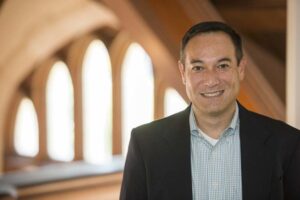 John Inazu, the Sally D. Danforth Professor of Law and Religion
John Inazu, the Sally D. Danforth Professor of Law and Religion
I occasionally teach an undergraduate seminar on religion and politics in which I show the 2006 documentary Jesus Camp. It’s a striking film that raises some hard-hitting and unsettling questions about certain Christian fundamentalist practices involving religious education and the training of children. Nothing illegal, but by many accounts manipulative. And for most of my students watching the film, definitely weird.
One of my favorite moments as a teacher came when a Jewish student in the class shared her reaction to the film: “I kept thinking as I was watching what someone would have said if they had visited the Jewish summer camp that I attended growing up. We had prayers and rituals that felt normal to me but would have looked bizarre from the outside.”
I wish some of the politicians and pundits weighing in on Judge Amy Coney Barrett’s religious practices could display half the empathy of my student. They could start with the basic recognition that many religious practices seem unfamiliar, weird and even threatening to outsiders. Catholics believe that the Eucharist transforms consecrated bread and wine into the body and blood of Jesus. Mormons baptize proxies for the dead. Some Jewish and Christian sects conduct exorcisms. All of these practices can be easily caricatured, ridiculed and othered.
Read the full piece in Newsweek.